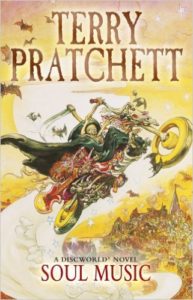Death not only had a daughter, it turns out he had a granddaughter as well. In between, he had an apprentice and, as these things often happen, the daughter married the apprentice and in due course the daughter arrived. One unfortunate night, a carriage went too fast around Dead Man’s Curve, which earned its name on that night as on so many others, and then Death only had a granddaughter. She grew up a bit, and was sixteen at the opening of Soul Music, the sixteenth Discworld book. That Terry Pratchett’s own daughter was sixteen around the time he wrote Soul Music is, surely, a coincidence.
Because the ordinary run of Death’s work is not only grim but of limited interest to those not immediately involved, it’s not surprising that the Discworld novels in which Death plays a prominent role concern breaks in the continuity: Mort, when Death first takes on an apprentice; Reaper Man, when he takes off for a bit; and now Soul Music, when he takes a more philosophical break, and granddaughter Susan gets called into the family business.
The other half of the story starts with a musician who has gone from simple rural lands to seek his fortune in the great city of Ankh-Morpork. He is a bard, winner of renowned prizes among his people, possessed of a harp of age and unparalleled beauty. He lasts about half a day. The Guild of Musicians discovers an unlicensed practitioner and instructs him on the consequences. Worse, the troll he had just met at the Guild sat on his harp, with predictable results. The bard, the troll and a dwarf try to rescue the situation by purchasing a new instrument, so the three of them can play music and earn enough to pay their Guild dues. In an olde music shoppe, they discover an instrument:
It looked, vaguely, like a guitar carved out of a piece of ancient wood by a blunt stone chisel. Although dwarfs did not, as a rule, play stringed instruments, Glod knew a guitar when he saw one, They were supposed to be shaped like a womanm but this was only the case if you thought women had no legs, a long neck and too many ears. …
Whauauaum. The sound had a saw-edged, urgent fringe to it, There were twelve strings, but the body of the instrument was solid wood, not at all hollow – it was more or less just a shape to hold the strings. (p. 41)
That one guitar is the beginning of Music With Rocks In It, the sensation that sweeps the nations. Or at least parts of Ankh-Morpork and as much of the neighboring territories as the unlikely trio and their hastily acquired manager, one C.M.O.T. Dibbler, can book them into. The music with rocks has a power that nobody seems to understand, least of all the lead guitarist, who seems to spend his performances possessed and the time between them mostly unconscious. The authorities are alarmed, but even the wizards find themselves bopping to the beat. Where will it all end?
Because this is Pratchett, there are some lovely one-off gags along the way, including “a mission from Glod,” the etymology of “wise,” viz. “from the Old wys-ars, lit.: one who, at bottom,is very smart” and a dialogue between two band members about the purpose of playing and what happens to superstars:
“…but the money isn’t important,” [said Buddy.]
“The money’s not important?” [said Glod], “You keep on saying that! What kind of musician are you?”
There was still a muted roar from outside.
“You want to go back to playing for half a dozen people in some cellar somewhere after this?” said Buddy. “Who’s the most famous horn player there ever was, Glod?”
“Brother Charnel,” said the dwarf promptly. “Everyone knows that. He stole the altar gold from the Temple of Offler and had it made into a horn and played magical music until the gods caught up with him and pulled his—”
“Right,” said Buddy, “but if you went out there now and asked who the most famous horn player is, would they remember some felonious monk or would they shout for Glod Glodsson?”
“They’d—”
Glod hesitated.
“Right,” said Buddy. “Think about that. A musician has to be heard. You can’t stop now. We can’t stop now.”
Glod waved a finger at the guitar.
“It’s that thing,” he said. “It’s too dangerous.”
“I can handle it!”
“Yes, but where’s it going to end?” (p. 219)
It ends as tales of rock and roll stardom often do, as Pratchett says it will at the very beginning of the book. But though Soul Music is about the ending, it is much more about how one gets there. And for some of the characters, it is about what happens after the ending.
“Grandfather?”
YES.
“You’re back?”
IT SEEMS SO. BUSY, BUSY, BUSY.
“So I can stop? I don’t think I was very good at it.”
YES.
“But … you’ve just broken a lot of laws …”
PERHAPS THEY’RE SOMETIMES ONLY GUIDELINES.
“But my parents still died.”
I COULDN’T HAVE GIVEN THEM MORE LIFE. I COULD ONLY HAVE GIVEN THEM IMMORTALITY. THEY DIDN’T THINK IT WAS WORTH THE PRICE.
“I … think I know what they mean.”
YOU’RE WELCOME TO COME AND VISIT, OF COURSE.
“Really?”
I SHALL KEEP YOUR ROOM EXACTLY AS YOU LEFT IT.
“Thank you.”
A MESS.
“Sorry.”
I CAN HARDLY SEE THE FLOOR. YOU COULD HAVE TIDIED IT UP A BIT.
“Sorry.” (p. 371)

